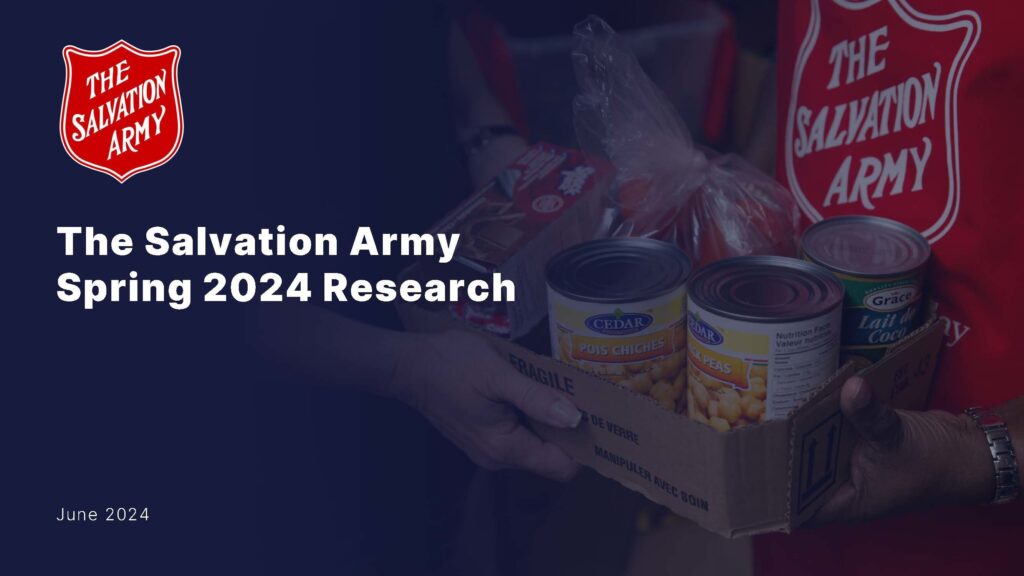Community
Salvation Army Research Finds Food Bank Usage on the Rise as Food Security Challenges Persist
TORONTO /CNW/ – New research from The Salvation Army Canada finds that many Canadians continue to struggle to meet their basic needs with food affordability, inflation and housing security challenges persisting as top issues.
As one of the largest non-governmental direct providers of social services in Canada, The Salvation Army produces the biannual Canadian Poverty and Socioeconomic Analysis to better understand the attitudes, behaviours and experiences of Canadians on issues such as the availability of housing and food, general affordability and related health outcomes.

Due to overwhelming feedback from policymakers, news media and other stakeholders, The Salvation Army will now produce the Canadian Poverty and Socioeconomic Analysis twice a year, in the spring and fall. This will allow The Salvation Army to quantify the demand for ongoing social services provided and help the organization to better serve those in need.
The most recent research shows Canadians rank health care, inflation and food affordability as their top concerns. These findings are in line with The Salvation Army’s internal data, which reveal households that were inactive in reaching out for help are now active, and the number of new households seeking assistance, such as food, clothing, furniture and emergency housing, is on the rise.
The report finds that 26 percent of Canadians polled continue to be extremely concerned about having enough income to cover their basic needs, and that concerns around food security are on the rise. While seven percent of respondents said they recently accessed a food bank, food hamper or community meal program (up from six percent in October 2023), the percentage of first-time users is up sharply, to 61 percent compared to 43 Percent in October 2023.
“The increase in first-time users of food banks is an alarming indicator of the conditions that many Canadians are facing,” said Lt-Colonel John Murray, territorial secretary for communications, The Salvation Army in Canada and Bermuda. “We often find that when people show up at a food bank it can be the tip of the iceberg for additional issues they may be facing. The Salvation Army is committed to a holistic approach in supporting people through partnerships that help create a positive impact on individuals and families.”
The number of respondents who said they had skipped or reduced the size of at least one meal increased to 26 percent, up from 21 percent previously (October 2023). More Canadians also said they’d bought less nutritious food to save money and had reduced their grocery bill to pay for other necessities.
On financial issues, 72 percent of respondents described challenges managing limited financial resources in the past year, including cutting back on non-essential needs (59 percent), changing habits to save money (52 percent) and using savings or going into debt to afford basic needs (36 percent).
“Despite easing inflation numbers, life is still difficult for many Canadians,” said Murray. “Food insecurity is just one symptom facing people today. At The Salvation Army, our vision is to reduce barriers and address the root causes of poverty, working together with people to achieve their goals in overcoming them.”
Last year, more than three million visits were made to The Salvation Army in Canada and Bermuda for assistance, including 2.1 million visits for food, clothing or practical help, 438,000 visits for Christmas food hampers and toys, and 3.2 million community meals.
Survey Methodology:
This report contains findings from research conducted by Edelman Data & Intelligence on behalf of The Salvation Army to uncover Canadians’ attitudes and experiences with poverty and related socioeconomic issues.
The study was conducted March 11-14, 2024, among a nationally representative sample of 1,515 Canadians who are members of the online Angus Reid Forum, balanced and weighted on age, gender and region. Note: Canadians living in Yukon, Northwest Territories and Nunavut were not included in the survey.
For comparison purposes only, a probability sample of this size would carry a margin of error of +/- 2.5 percentage points, 19 times out of 20. And, where a margin of error is not available, the research department provides a comparable one so that the audience can have some context to the value of the poll.
About The Salvation Army:
The Salvation Army is an international Christian organization that began its work in Canada in 1882 and has grown to become one of the largest direct providers of social services in the country. The Salvation Army gives hope and support to vulnerable people in 400 communities across Canada and in more than 130 countries around the world. Its community and social service activities include: hunger relief for individuals and families through food banks and feeding programs; shelter for people experiencing homelessness and support for those needing housing; rehabilitation for those struggling with substance-use recovery; long-term care and palliative care; Christmas assistance, such as food hampers and toys; after-school programs, camps and school nutrition programs for children and youth; and life-skills classes, such as budgeting, cooking for a family, and anger management. When you give to The Salvation Army, you are investing in the future of people in your community.
News releases, articles and updated information can be found at https://salvationarmy.ca/
A list of regional media representatives can be found at: https://salvationarmy.ca/news-and-media/media-contacts/
SOURCE The Salvation Army